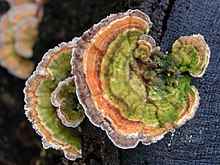Polysaccharide-K (Krestin, PSK) is a protein-bound polysaccharide isolated from the mycelium[1][2] of Trametes versicolor.

Research
editPSK is one of the most commonly used medicinal mushroom extracts with a long history as an additive in cancer therapy in Asia, especially in Japan. PSK has adjuvant anti-tumor activity in vitro in various types of cancers, including colorectal, gastric, breast, liver, pancreatic, and lung cancer.[3]
Preliminary studies examining PSK include its use in conjunction with chemotherapy for colorectal cancer,[4][5] non-small cell lung carcinoma,[6] breast cancer,[7] liver cancer,[8] and leukemia.[9]
Chemistry
editPSK is a protein polysaccharide consisting of a beta-glucan β-1,4 main chain with β-1,3 and β-1,6 side chains. The approximate molecular weight of PSK is 100,000 Da, and the protein component is reported at the β-1,6 side chain.[10] PSK is isolated from the "CM-101" strain of Trametes versicolor. The analogous compound PSP, is derived from the "COV-1" strain of Trametes versicolor.[11]
See also
editReferences
edit- ^ Yang, Dandan; Zhou, Zijing; Zhang, Lijuan (2019). Progress in Molecular Biology and Translational Science. Chapter Eight - An overview of fungal glycan-based therapeutics: Academic Press. pp. 135–163. ISBN 9780128177402. Retrieved 24 January 2023.
- ^ Habtemariam, Solomon (2020). "Trametes versicolor (Synn. Coriolus versicolor) Polysaccharides in Cancer Therapy: Targets and Efficacy". Biomedicines. 8 (5): 135. doi:10.3390/biomedicines8050135. PMC 7277906. PMID 32466253.
- ^ M, Fisher; LX, Yang. "Anticancer effects and mechanisms of polysaccharide-K (PSK): implications of cancer immunotherapy". Anticancer Research. 22 (3). Anticancer Res. ISSN 0250-7005. PMID 12168863. Retrieved 2023-12-22.
- ^ Oba K, Teramukai S, Kobayashi M, Matsui T, Kodera Y, Sakamoto J (June 2007). "Efficacy of adjuvant immunochemotherapy with polysaccharide K for patients with curative resections of gastric cancer". Cancer Immunology, Immunotherapy. 56 (6): 905–11. doi:10.1007/s00262-006-0248-1. PMC 11030720. PMID 17106715. S2CID 161680.
- ^ Mitomi T, Tsuchiya S, Iijima N, et al. (February 1992). "Randomized, controlled study on adjuvant immunochemotherapy with PSK in curatively resected colorectal cancer. The Cooperative Study Group of Surgical Adjuvant Immunochemotherapy for Cancer of Colon and Rectum (Kanagawa)". Diseases of the Colon and Rectum. 35 (2): 123–30. doi:10.1007/BF02050666. PMID 1735313. S2CID 68080825.
- ^ Hayakawa K, Mitsuhashi N, Saito Y, et al. (1997). "Effect of Krestin as adjuvant treatment following radical radiotherapy in non-small cell lung cancer patients". Cancer Detection and Prevention. 21 (1): 71–7. PMID 9043766.
- ^ Iino Y, Yokoe T, Maemura M, et al. (1995). "Immunochemotherapies versus chemotherapy as adjuvant treatment after curative resection of operable breast cancer". Anticancer Research. 15 (6B): 2907–11. PMID 8669887.
- ^ Suto T, Fukuda S, Moriya N, et al. (1994). "Clinical study of biological response modifiers as maintenance therapy for hepatocellular carcinoma". Cancer Chemotherapy and Pharmacology. 33 Suppl: S145–8. doi:10.1007/BF00686688. PMID 8137477. S2CID 25538345.
- ^ Ohno R, Yamada K, Masaoka T, et al. (1984). "A randomized trial of chemoimmunotherapy of acute nonlymphocytic leukemia in adults using a protein-bound polysaccharide preparation". Cancer Immunology, Immunotherapy. 18 (3): 149–54. doi:10.1007/BF00205503. PMC 11039289. PMID 6391658. S2CID 24000083.
- ^ Kobayashi H, Matsunaga K, Oguchi Y (1995). "Antimetastatic effects of PSK (Krestin), a protein-bound polysaccharide obtained from basidiomycetes: an overview". Cancer Epidemiology, Biomarkers & Prevention. 4 (3): 275–81. PMID 7606203.
- ^ Fisher M, Yang LX (2002). "Anticancer effects and mechanisms of polysaccharide-K (PSK): implications of cancer immunotherapy". Anticancer Research. 22 (3): 1737–54. PMID 12168863.
External links
edit- American Cancer Society's page for Trametes versicolor and Polysaccharide-K.
- Memorial Sloan-Kettering Cancer Center's page for Trametes versicolor and Polysaccharide-K.
- A "Detailed Scientific Review of Trametes versicolor and Polysaccharide-K" by the MD Anderson Cancer Center.
- Trametes versicolor and Polysaccharide-K information from Drugs.com.